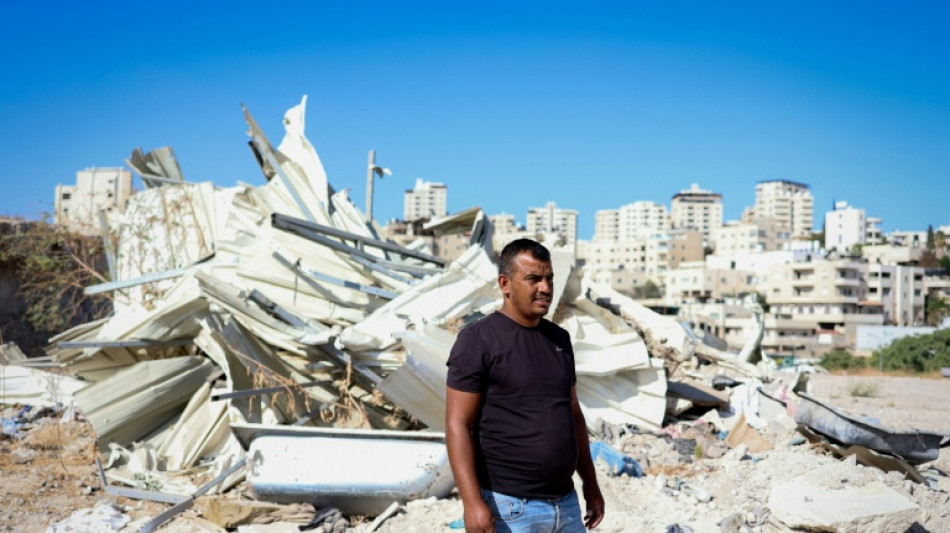
Palestinians fear new Israeli settlement will wreck their town

In a town near Jerusalem, a growing number of houses and businesses are receiving demolition and evacuation notices, and Palestinian residents link the drive to Israel's approval of a major new settlement project.
"This is a project of total destruction for the economy and the people. It will affect everyone," said Yahya Abu Ghaliyeh, whose home in Al-Eizariya town was demolished by Israeli authorities earlier this year.
Now, the 37-year-old's car wash business is also due for demolition.
The notices say the buildings were constructed without permits, and no official Israeli statement links the demolition orders to the settlement project.
But Palestinian residents say such permits are nearly impossible to obtain from Israel, which has occupied the West Bank since 1967.
They also link the impending demolitions to the E1 plan, one of the largest West Bank settlement projects ever approved by Israel.
The project, which aims to build approximately 3,400 housing units, will connect Jerusalem with nearby Maale Adumim, one of the largest Israeli settlements in the West Bank.
- E1 project -
In August, Israel gave the green light to E1, a new construction project covering some 12 square kilometres (4.5 square miles) to the east of Jerusalem.
The E1 plan has been condemned by several international leaders, with the UN chief's spokesman saying it would pose an "existential threat" to a contiguous Palestinian state.
The move would further separate east Jerusalem, occupied and annexed by Israel and predominantly inhabited by Palestinians, from the West Bank.
Excluding east Jerusalem, 500,000 Israelis live in settlements throughout the West Bank. These settlements are illegal under international law.
The E1 project includes a new road between Jerusalem and Maale Adumim, which would not be accessible from Al-Eizariya, even though it runs through the town.
Khalil Tufakji, director of cartography at Jerusalem's Arab Studies Society, told AFP the project would ensure that Palestinians "cannot use the roads designated for Israelis", describing it as "apartheid between Arabs and Jews".
People travelling between Al-Eizariya and Jerusalem would have to take a circuitous route three times longer than the present journey, he said.
- Lazarus tourism -
Al-Eizariya, which has around 22,000 residents, is also known as Bethany: the town is home to the tomb and church of Lazarus, which draw half a million tourists annually, according to Mayor Khalil Abu Rish.
Many Palestinians, especially from east Jerusalem, shop along its four-kilometre-long shopping street, he said.
On Saturdays, people often flock to buy wedding outfits, tableware or sweets.
"The project will harm tourism," the mayor told AFP.
Al-Eizariya is bordered to the west by the separation barrier built by Israel in the early 2000s.
Last month, Israel installed a security gate at the town's eastern entrance, one of nearly a thousand gates it has placed at the entrances of Palestinian villages, towns and cities recently.
The Israeli military told AFP that it "issued demolition orders for several illegal buildings constructed in an unlicensed area that pose a threat to the area's security."
Aviv Tatarsky, a researcher at the Israeli anti-settlement organisation Ir Amim, said no official Israeli statement linked the demolition and evacuation notices in Al-Eizariya to the E1 project.
But he believes Israel wants "to take over the land in Area C... which leads to increasing the number of settlers and displacing Palestinian communities."
Area C refers to the roughly 66 percent of the West Bank placed under Israeli civil and security control under the Oslo accords agreed between Israel and the Palestinian Authority in the 1990s.
- 'This is our land' -
Car wash owner Abu Ghaliyeh said: "They (the Israelis) only think of their own interests," adding: "It's as if the Palestinian community were livestock."
"They don't care if I end up sleeping in the open.
"They are chasing away our livelihoods and that of our children," added the father of five, who employs five people.
"I've been here for 10 years, we built a customer base -- how can they ask me to evacuate?"
A few metres along the street, Naji Assakra said he received a demolition notice for his metal workshop as well, which he said supports six families.
Mohammed Matar, a Palestinian Authority official tasked with combating settlement activity, predicted that E1 would trigger a major demographic shift in the area, with Israeli settlers becoming "twice as numerous as Palestinians".
Furthermore, "it will displace more than 24 Palestinian Bedouin communities, all of which rely on livestock", he added, and therefore land for grazing.
An Israeli court rejected an appeal filed by Israeli NGOs demanding the project's annulment.
For now, Abu Ghaliyeh insists on staying.
"I do not intend to evacuate," he said.
"This is our land: Palestinian land."
F.Morgan--TNT